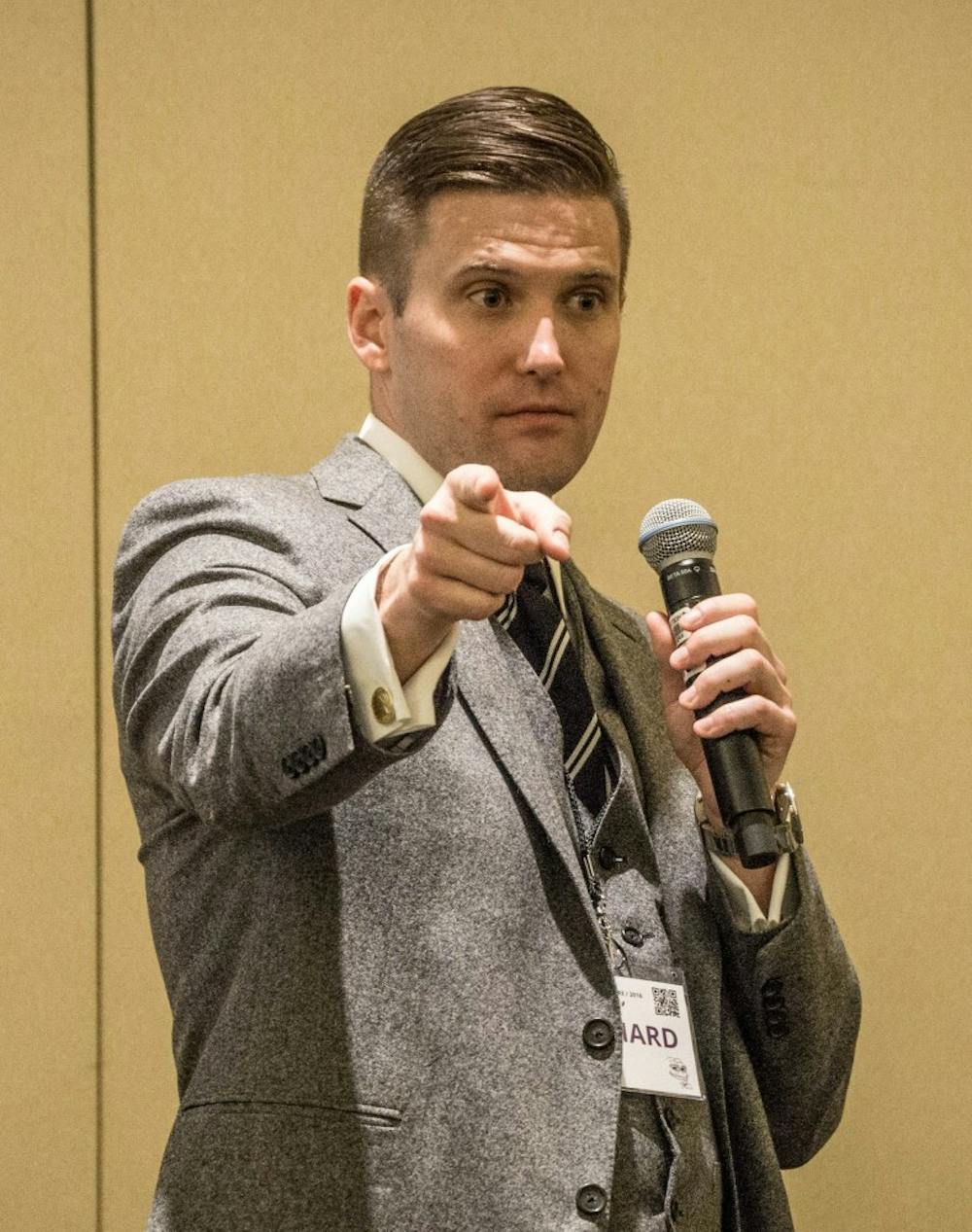Richard Spencer, a white nationalist and University alumnus known for his involvement in the Aug. 11 and 12 “Unite the Right” rallies, cannot find a lawyer to represent him after being sued for emotional and physical traumas caused by the protests.
Spencer is one of 25 defendants in a civil lawsuit that was filed in federal district court this past October. White nationalist Jason Kessler, who was involved with organizing the Unite the Right rally, and James Alex Fields Jr. — the man accused of driving his car into counter protesters and killing Heather Heyer — are also defendants in this case. The 11 plaintiffs claim injury from the events of Aug. 11 and 12.
Spencer submitted a memorandum Jan. 30 to the court supporting his motion to dismiss the plaintiff’s case against him. Spencer has not been able to secure a lawyer to represent him thus far in this case. In his motion to the court, he is representing himself as pro se and wrote the document himself.
Local attorneys Michael Hallahan and Denise Lunsford are representing Kessler and Fields, respectively. Lunsford declined to comment, stating she does not speak on the record on pending cases. Hallahan did not return a request for comment as of press time.
In an interview with BuzzFeed News, Spencer described his efforts in obtaining legal representation in Virginia.
"I get into a conversation with a lawyer and it will end up with, 'Oh, this is very controversial, it could affect my career,’” he said.
"Spencer, by contrast, has searched for legal help and has not been able to find a lawyer licensed in Virginia to take his case, despite the supposed but apparently illusory ethical obligation lawyers have to represent unpopular clients and to assure at least a semblance of a fair trial," he writes in his memorandum to the court.
While Spencer comments on the “illusory ethical obligation” that lawyers represent a given defendant, there is not a guaranteed right to an attorney in civil lawsuits.
The Sixth Amendment guarantees the rights of criminal defendants, including the right to an attorney, the right to a speedy and public trial, the right to an impartial jury, the right to know the defendant’s accusers and the right to know the nature of the charges against the defendant.
Many of the defendants in this case have filed motions of dismissal and few have filed without the representation of a lawyer. Kessler, who also filed a dismissal, has been critical of Spencer’s choice to proceed without legal representation.
Kessler has actively spoken against Spencer through his Twitter account, signaling a growing rift between the two white nationalists, who worked together to promote the rallies this past August. The two have been disassociating from one another for several months, predominantly though social media.
Spencer’s memorandum includes arguments about the plaintiff’s motivation, stating that the lawsuit “is an example of what has come to be known as ‘lawfare,’ that is, an attempt to use the legal system to intimidate, silence, financially damage, or generally harass defendants — often for political or personal motives.”
Organizations have historically used litigation as a means to bankrupt white supremacist groups, such as the Southern Poverty Law Center suing various Ku Klux Klan affiliates. In 2008, the SPLC went after several white supremacist organizations, leading to millions of dollars in lawsuit settlements.
“It's all about the money. It's all about the money. If you stop the money, you'll cut the organization off," said Morris Dee, lead attorney at the SPLC at the time, to the jurors of a case against a Kentucky-based Ku Klux Klan group.
Spencer acknowledges the violent outcomes of Aug. 12, including reference to the fights which broke out amidst the protests, the two state troopers killed in a helicopter crash and the death of Heather Heyer. He names James Alex Fields Jr. as the driver of the vehicle which killed Heyer, although Spencer misspelled her name as “Hyer” in his memorandum submitted to the court.
Spencer argues against the plaintiff’s claim that he was an “organizer” of the Aug. 11 and 12 rallies and, instead, was a “speaker and participant.” He also argues in his motion that Antifa, an anti-fascist group who counter-protested the Unite the Rally, is responsible for the violence of Aug. 12.
In Spencer’s memorandum he also writes that the responsibility falls on the Charlottesville Police Department, citing the report released last December criticizing the Charlottesville and University police.
The memorandum consistently cites the infringement on the First Amendment rights, claiming how Antifa attacks freedom of speech and how this case against him and the other defendants will cause damage to the First Amendment.
“The complaint in this case is a spurious, albeit well financed, act of lawfare that should shame any attorney who has a genuine respect for principles of free speech and assembly,” Spencer writes.
Spencer also critiques the semantics of the plaintiffs’ case, particularly in regards to the examples of “emotional injury” presented to the court, stating the words and evidence used against him are hyperbolic and inaccurate.
There has not been a response from the court as of now on the status of Spencer’s motion. Additionally, there has not been a set date for the hearing, which will take place in the federal court in Charlottesville.
Richard Spencer told BuzzFeed News he will continue his search for a lawyer to represent him in this lawsuit if his motion to dismiss is denied by the judge.
Another lawsuit was filed on Oct.12 against the organizers of the “Unite the Right” rally that aims to prevent the mobilization of private militias. This lawsuit includes the City of Charlottesville, local businesses and neighborhoods as plaintiffs. Spencer is not one of the defendants in this case, but Jason Kessler and several militias present on Aug. 12 are included.







